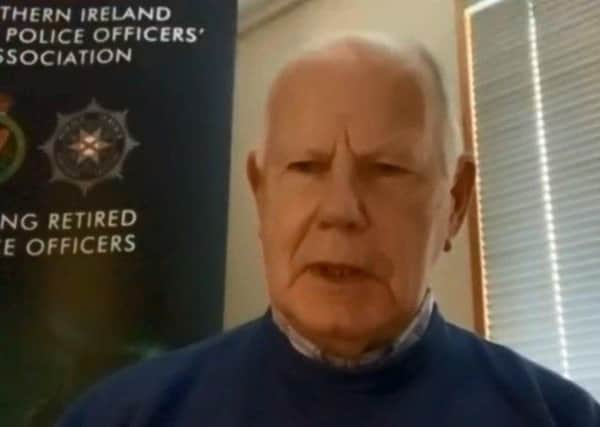New NI legacy commissioner proposed as way forward on Troubles probes


Addressing the Northern Ireland Affairs Committee (NIAC) on Wednesday, former assistant chief constable Raymond White said it was vitally important that the legacy institutions are free from manipulation – and that substantial reinvestigations should only be triggered when there is “fresh and compelling” evidence.
The NIAC evidence session had been called to discuss the government’s latest proposals on dealing with the past.
Advertisement
Hide AdAdvertisement
Hide AdMr White, representing the NI Retired Police Officers’ Association (NIRPOA), said one of the first issues to be addressed should be a clear and concise definition of what constitutes fresh and compelling evidence.
“The legacy commissioner would act as the arbiter of whether or not the threshold of compelling new evidence had been reached in order to justify or trigger a new investigation or reinvestigation of a case,” he said.
The NIRPOA has suggested that the commissioner should be “a person of high judicial standing with a small personal secretariat and a range of functions and responsibilities” on legacy matters, and that such an appointment would “secure public confidence in the [legacy] institutions”.
Speaking to the News Letter following the evidence session, Mr White said the vast sums of money being spent on Troubles-era investigations should be used to resource the PSNI’s own Legacy Investigation Branch – ensuring the investigators were accountable before the chief constable, the policing board and the ombudsman.
Advertisement
Hide AdAdvertisement
Hide Ad“It is accepted that the PSNI is sufficiently impartial to investigate dissident republicans and loyalist paramilitaries, yet some still claim it is not impartial enough to investigate Troubles incidents. No one in the PSNI was serving when the majority of these incidents took place nearly 50 years ago so that argument is redundant and needs to be challenged,” Mr White added.
Also giving evidence to the NIAC, Chris Albiston of the NIRPOA said there should be “credible evidence” and “a realistic prospect of a conviction” before substantial new investigations are launched.
“We need a system that adheres to the principles of justice,” he said.
The former assistant chief constable also said that where there was no prospect of a conviction, then the commissioner could scrutinise any information made available to bereaved families.
Advertisement
Hide AdAdvertisement
Hide AdMr Albiston said: “Our submission is that a legacy commissioner, as well as being a filter for what is new and compelling [evidence], could be a filter for determining whether a [family] report is satisfactory, whether it is as full as it might be, and whether it meets the needs of the families themselves.”
In a written submission to the NIAC, ahead of Wednesday’s evidence session, the NIRPOA said: We do not see the pursuit of justice through the law as being by itself a bar to reconciliation; but if carried out in a partisan and partial manner and against all principles of natural justice and undertakings previously given to serving members of the security forces then it could be. We therefore welcome what appears to be an extension to Northern Ireland of the principles espoused in the legislation to address the concerns of military veterans in relation to overseas campaigns.
“As we have stated in the past (for example to Eames/Bradley, to Haass and to NIAC), we believe that if we are to achieve reconciliation here then the history of the last 50 years should be written by historians – and not by politicians, lawyers and polemicists.”
The submission concluded: “The association welcomes what appears to be a significant change in emphasis in the new government proposals to address legacy issues and we offer above some suggestions as to how this might work in practice. There is optimism that the mistakes made in the drafting of the 2018 Bill will not be repeated in 2020.
Advertisement
Hide AdAdvertisement
Hide Ad“As an association we have naturally offered suggestions which we believe will be in the interests of our members and of the wider police family. However, we also believe that our suggestions, which are geared towards just outcomes for all, whether through criminal justice processes or information retrieval and dissemination, will also be in the best interests of all.”
A message from the Editor:
Thank you for reading this story on our website. While I have your attention, I also have an important request to make of you.
With the coronavirus lockdown having a major impact on many of our advertisers - and consequently the revenue we receive - we are more reliant than ever on you taking out a digital subscription.
Subscribe to newsletter.co.uk and enjoy unlimited access to the best Northern Ireland and UK news and information online and on our app. With a digital subscription, you can read more than 5 articles, see fewer ads, enjoy faster load times, and get access to exclusive newsletters and content. Visit https://www.newsletter.co.uk/subscriptions now to sign up.
Advertisement
Hide AdAdvertisement
Hide AdOur journalism costs money and we rely on advertising, print and digital revenues to help to support them. By supporting us, we are able to support you in providing trusted, fact-checked content for this website.
Alistair Bushe